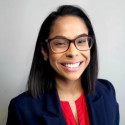As the chaos from the day settled and my junior residents were finishing up their notes, I opened my phone to scroll and catch up on personal business, when I noticed my student was not in the work room. I couldn’t recall the last time I saw him. Feeling guilty, given I promised myself I would be better about dismissing my students in a timely manner, I called him and asked if he was OK, and informed him if he was finished with work, he could go home.
“Oh, OK thank you. I’ll leave soon. I’m up in Mr. X’s room. I figured I would sit with him for a bit. He was nervous about his surgery tomorrow, and I wanted him to know we were here for him. He’s feeling better about tomorrow!” I replied how kind that was of him, further thanking him for thinking to do so, and told him he was free to leave whenever he finished.
I sheepishly slunk into my seat. A wave of embarrassment hit, acknowledging my decision to scroll on my phone, yet my student had thought to go sit with our patient … to talk. Just to be there. Truthfully, I had the time. It wouldn’t have taken much to walk up one floor to talk with a patient having an invasive procedure tomorrow. All the other patients were “tucked in” as they say — at least medically tucked in. But how many were laying there, silently anxious?
I sank lower into that chair. I’m the senior of this team — the primary role model. The patient did appear nervous during rounds … I should have thought to go back up there. I could have extended my heart a bit more.
Physicians understand the significance of displaying empathy and compassion to patients during vulnerable moments. We do our best to provide support in the short time which current practice of medicine provides. We introduce ourselves when we enter patient rooms with, “I’m Dr. So-and-So with the family medicine team.” Yet, how often do patients feel we are truly on their team? For my student doctor to sit with him for a few minutes just to ease some pre-surgical anxiety took a few minutes of his time, and, as ashamed as I am to say, would have taken not more than a few minutes of mine.
I’ve heard the phrase, “kindness is a gift anyone can give.” And as a leader who holds responsibility for serving as a mentor and teacher, I am truly grateful to my student doctor for representing that perspective to me that afternoon, serving paradoxically as a teacher to myself.
“The patient will tell you everything you need to know — you just have to ask the right question,” another student said to me.
Minutes prior, I had remarked to her, “Great history! Sounds like you asked all the right ‘chest pain’ questions.”
She looked at me for a moment, then remarked: “Honestly, Dr. Jacobs, I actually only asked one question — how he was feeling. He started speaking and I just didn’t interrupt him for, I don’t know, three or four minutes? Eventually he just said everything I needed.”
She listened for three straight minutes. Uttered not a word. She was in and out of the room in less than maybe seven minutes. When I walked in to see the patient, he eagerly informed me of how “receptive, warm, and kind” my student was. She was spot on with her differential and diagnosis. Perhaps it is the 20-patient census of an inpatient team, or maybe the 15-minute turn-around time for outpatient clinical visits which creates an urgency to dictate the interaction so heavily. It tempts us to stop a patient in their tracks to prevent what is perceived as “rambling” or eating into precious minutes. But, if I allowed patients to say their lot in its entirety, perhaps those critical clues or pieces of the story proving essential would all come out via their own depiction. Am I more efficient for insisting on asking the questions I feel I need to ask? I thought: Have I been listening?
Even further, silence can effectively send the strongest messages. I once found myself on a new resident team, including a medical student, facing quite the critique from a patient displeased with aspects of care he received during his hospital stay. Allowing my student the opportunity to attempt working through conflict resolution, his response to the confrontation was … minimal. He said almost nothing for quite some time. I could feel my co-residents shifting on their feet as the patient’s monologue continued, recounting his feelings of invalidation. My student doctor? Quiet and still as a statue, moving only to nod in agreement. I then realized we were only able to shift our feet because we all stayed standing to provide what was anticipated to be a short update — Student Doctor, however, had elected to sit. And just when my attending attempted to interject to gently pause the discourse, the patient stopped speaking. He grasped my student’s hand and thanked him, tears in his eyes, for listening. He felt seen. His silence spoke louder than any words could, saying, I hear you, you are cared for. As a young physician in training, he understood the power of listening to understand, not to respond — Stephen Covey would have been proud.
Students’ perspectives can help surface the humanism in us which is often displaced by the grueling pressures of residency. The impact of kindness and listening have proven pivotal for me as a young physician, and I have learned these lessons through the observation of my medical students. For them, I am grateful.
To medical students: your awareness of the way your nurturing essence positively influences your practice, both personally and professionally, provides invaluable grounding to your senior physicians. You give me hope.
May we allow those in short white coats to influence us, as being kind and listening are gifts anyone can afford to give.
What have you learned from the medical students in your life? Share lessons in the comments.
Dr. Kaitlyn Jacobs is a third-year family medicine resident in Houston, Texas. She is passionate about caring for underserved populations and excited to be transitioning into full-time clinical practice providing primary care for disadvantaged populations after residency.
Image by GoodStudio / Shutterstock






